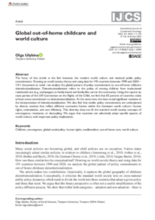Abstract:
The focus of this article is the link between the modern world culture and national public policy commitments. Drawing on world society theory and using data for 193 countries between 1990 and 2020—1411 documents in total—the authors analyze the global pattern of policy commitments to out-of-home childcare deinstitutionalization. Deinstitutionalization refers to the policy of moving children from institutional residential care (e.g. orphanages) to family-based and family-like care in the community.
Using the reports by state parties of the UN Convention on the Rights of the Child, we find that 85 percent of countries make at least some commitment to deinstitutionalization. At the same time, the data reveal significant variation in the interpretation of deinstitutionalization.
The authors also find that similar policy commitments are underpinned by diverse motives that reflect different normative frames within the dominant world culture—human rights, scientization, and cost efficiency. This diversity does not fit the standard world society concepts of convergence, resistance, or decoupling. The authors argue that countries can selectively adopt specific aspects of world culture, with important policy implications.

